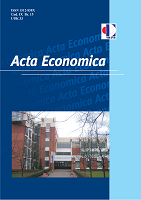INFLATION, EMPLOYMENT AND FDI IN BOSNIA AND HERZEGOVINA
INFLATION, EMPLOYMENT AND FDI IN BOSNIA AND HERZEGOVINA
Author(s): Goran Popović, Maja IbrahimbegovićSubject(s): National Economy, Business Economy / Management, Labor relations, Fiscal Politics / Budgeting
Published by: Економски факултет Универзитета у Бањој Луци
Keywords: currency board; BIH; inflation; unemployment; FDI; monetary policy; Phillips curve;
Summary/Abstract: The monetary policy of Bosnia and Herzegovina (hereinafter referred to as BIH) operates under the currency board system, responsible for strengthening the market economy and price stability. On the other hand, the economy of BIH is facing longterm unemployment, unfavorable business environment and feeble competitive position. This discourages economic development. Further retaining the currency board system in BIH attracts great interest. The paper analyzes the relation among inflation, unemployment and foreign direct investment (FDI). Statistical analysis (coefficient of correlation and simple linear regression (period 2004/2014)) indicates that there is no inversion similar to the Phillips curve between inflation and unemployment. Thus, it is implied that BIH renounces employment, aggregate demand and economic growth for the sake of stable prices. Moreover, the ratio of inflation and participation of FDI in GDP is inverse with a negligible correlation. Analyses demonstrate that there is no optimal combination of inflation and unemployment in BIH that would improve business environment and stimulate FDI and aggregate demand. Correlation and regression analyses fail to provide the arguments to statistically challenge the currency board as the monetary system model of BIH.
Journal: Acta Economica
- Issue Year: 15/2017
- Issue No: 26
- Page Range: 165-178
- Page Count: 14
- Language: English

